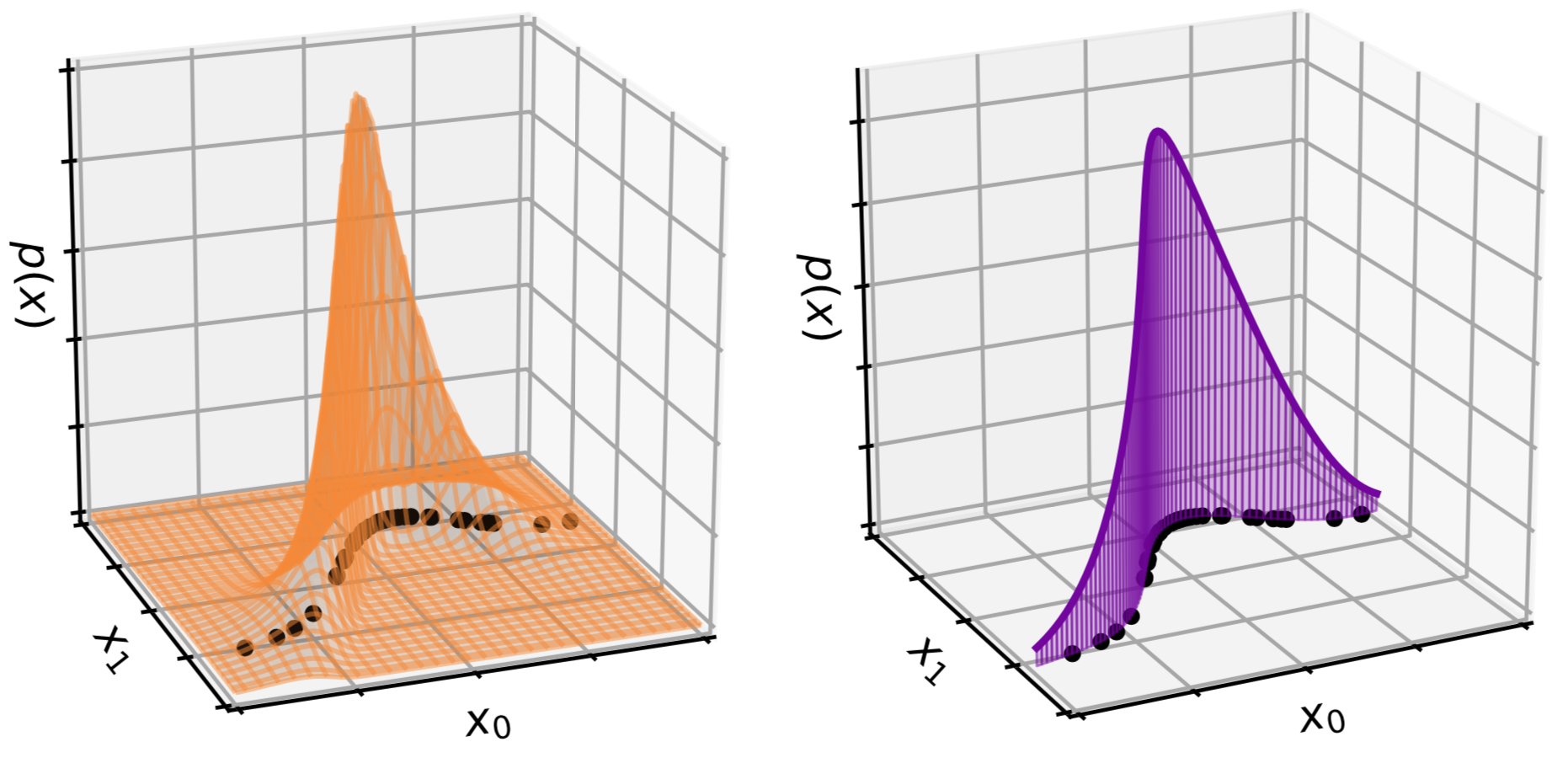Johann Brehmer and Kyle Cranmer 2019-2020
In the paper Flows for simultaneous manifold learning and density estimation we introduce manifold-modeling flows (MFMFs), a new class of generative models that simultaneously learn the data manifold as well as a tractable probability density on that manifold. This repository contains our implementation of manifold-modeling flows as well as some other fow-based generative models, as well as the code for our experiments with them.
Please make sure your Python environment satisfies the requirements in the environment.yml. To use the MFMF-OT algorithm, please also follow the installation instructions for geomloss.
| Data set | Data dimension | Manifold dimension | Model parameters | Arguments to generate_data.py, train.py, and evaluate.py |
|---|---|---|---|---|
Gaussian on an n-sphere |
n |
d |
- | --dataset spherical_gaussian --truelatentdim n --datadim d --epsilon eps |
Conditional Gaussian on a n-sphere |
n |
d |
2 | --dataset conditional_spherical_gaussian --truelatentdim n --datadim d |
| Mixture model on a polynomial manifold | 3 | 2 | 1 | --dataset power |
| Particle physics data (48D) | 48 | 14 | 2 | --dataset lhc |
| Particle physics data (40D, no angular features) | 2 | 2 | 2 | --dataset lhc2d |
| Particle physics data (2D summary stats) | 2 | 2 | 2 | --dataset lhc2d |
Necessary for the first three data sets in the table above. See experiments/generate_data.py -h.
See experiments/train.py -h. Note that the algorithms have different internal names from the acronyms in the paper:
| Algorithm | Acronym in paper | Arguments to train.py |
|---|---|---|
| Ambient flow | AF | --algorithm flow |
| Flow on manifold | FOM | --algorithm mf --specified |
| Pseudo-invertible encoder | PIE | --algorithm pie |
| Manifold-modeling flow, simultaneous training (not recommended) | MFMF-S | --algorithm mf |
| Manifold-modeling flow, alternating M/D training | MFMF-M/D | --algorithm mf --alternate |
| Manifold-modeling flow, sequential M/D training | MFMF-M/D | --algorithm mf --sequential |
| Manifold-modeling flow, Optimal Transport training | MFMF-OT | --algorithm gamf |
| Manifold-modeling flow, alternating Optimal Transport training | MFMF-OT/D | --algorithm gamf --alternate |
| Manifold-modeling flow with sep. encoder, simultaneous training (not recommended) | MFMFE-S | --algorithm emf |
| Manifold-modeling flow with sep. encoder, alternating M/D training | MFMFE-M/D | --algorithm emf --alternate |
| Manifold-modeling flow with sep. encoder, sequential M/D training | MFMFE-M/D | --algorithm emf --sequential |
See experiments/evaluate.py -h and the notebooks in experiments/notebooks. Note that the algorithms have different internal names from the acronyms in the paper:
| Algorithm | Acronym in paper | Arguments to evaluate.py |
|---|---|---|
| Ambient flow | AF | --algorithm flow |
| Flow on manifold | FOM | --algorithm mf --specified |
| Pseudo-invertible encoder | PIE | --algorithm pie |
| Manifold-modeling flow (except OT training) | MFMF | --algorithm mf |
| Manifold-modeling flow, Optimal Transport training | MFMF-OT | --algorithm gamf |
| Manifold-modeling flow with sep. encoder | MFMFE | --algorithm emf |
The code is largely based on the excellent Neural Spline Flow code base by C. Durkan, A. Bekasov, I. Murray, and G. Papamakarios, see 1906.04032 for their paper.



